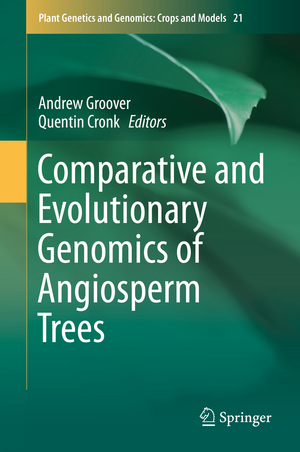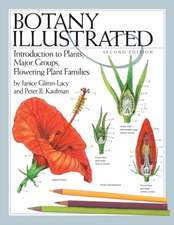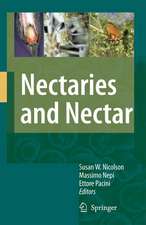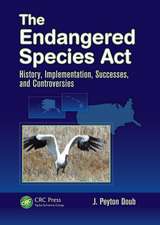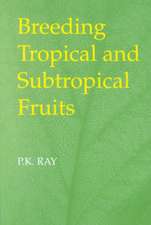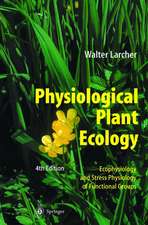Comparative and Evolutionary Genomics of Angiosperm Trees: Plant Genetics and Genomics: Crops and Models, cartea 21
Editat de Andrew Groover, Quentin Cronken Limba Engleză Hardback – dec 2017
The first section of the book discusses background on the evolution and diversification of angiosperm trees, as well as offers description of the salient features and diversity of the unique physiology and wood anatomy of angiosperm trees. The second section explores the two most advanced model angiosperm tree species (poplars and eucalypts) as well as species that are soon to emerge as new models. The third section describes the structural features and evolutionary histories of angiosperm tree genomes, followed by a fourth section focusing on the genomics of traits ofbiological, ecological, and economic interest. In summary, this book is a timely and well-referenced foundational resource for the forest tree community looking to embrace comparative approaches for the study of angiosperm trees.
| Toate formatele și edițiile | Preț | Express |
|---|---|---|
| Paperback (1) | 840.89 lei 38-44 zile | |
| Springer International Publishing – 5 sep 2018 | 840.89 lei 38-44 zile | |
| Hardback (1) | 1009.54 lei 6-8 săpt. | |
| Springer International Publishing – dec 2017 | 1009.54 lei 6-8 săpt. |
Din seria Plant Genetics and Genomics: Crops and Models
- 18%
 Preț: 967.40 lei
Preț: 967.40 lei - 18%
 Preț: 1240.47 lei
Preț: 1240.47 lei - 18%
 Preț: 1235.88 lei
Preț: 1235.88 lei - 18%
 Preț: 956.33 lei
Preț: 956.33 lei - 18%
 Preț: 1233.06 lei
Preț: 1233.06 lei - 18%
 Preț: 955.08 lei
Preț: 955.08 lei - 18%
 Preț: 1228.29 lei
Preț: 1228.29 lei - 18%
 Preț: 1121.13 lei
Preț: 1121.13 lei - 20%
 Preț: 574.08 lei
Preț: 574.08 lei - 18%
 Preț: 943.73 lei
Preț: 943.73 lei - 18%
 Preț: 948.92 lei
Preț: 948.92 lei - 18%
 Preț: 1234.14 lei
Preț: 1234.14 lei - 18%
 Preț: 2116.19 lei
Preț: 2116.19 lei - 18%
 Preț: 1221.69 lei
Preț: 1221.69 lei - 18%
 Preț: 1235.43 lei
Preț: 1235.43 lei - 9%
 Preț: 1007.69 lei
Preț: 1007.69 lei
Preț: 1009.54 lei
Preț vechi: 1231.15 lei
-18% Nou
Puncte Express: 1514
Preț estimativ în valută:
193.20€ • 200.96$ • 159.50£
193.20€ • 200.96$ • 159.50£
Carte tipărită la comandă
Livrare economică 15-29 aprilie
Preluare comenzi: 021 569.72.76
Specificații
ISBN-13: 9783319493275
ISBN-10: 3319493272
Pagini: 390
Ilustrații: XXII, 366 p. 160 illus., 27 illus. in color.
Dimensiuni: 155 x 235 mm
Greutate: 0.72 kg
Ediția:1st ed. 2017
Editura: Springer International Publishing
Colecția Springer
Seria Plant Genetics and Genomics: Crops and Models
Locul publicării:Cham, Switzerland
ISBN-10: 3319493272
Pagini: 390
Ilustrații: XXII, 366 p. 160 illus., 27 illus. in color.
Dimensiuni: 155 x 235 mm
Greutate: 0.72 kg
Ediția:1st ed. 2017
Editura: Springer International Publishing
Colecția Springer
Seria Plant Genetics and Genomics: Crops and Models
Locul publicării:Cham, Switzerland
Cuprins
Preface.- Paleobotanical origins and diversification of angiosperm trees.- Diversification of angiosperm trees.- Secondary woodiness.- Salient features and variation in angiosperm wood anatomy and physiology.- Populous.- Eucalyptus.- Emerging genomics of angiosperm trees.- Structural genomics, genome duplications/ploidy, repeat sequences.- Evolutionary histories of gene families.- Population genomics, mating systems, gender determination.- Speciation and hybridization.- Perennial growth, form and architecture.- Wood development and chemistry.- Phenology, maturation and flowering.- Abiotic stress.- Ecological and landscape genomics.- Pathogen, insect, and symbiotic interactions.- Index.
Notă biografică
Dr. Andrew Groover
United States Forest Service
Pacific Southwest Research Station
Davis, California
USA
Dr. Quentin Cronk
University of British Columbia
Department of Botany
Vancouver, British Columbia
Canada
Textul de pe ultima copertă
Marking the change in focus of tree genomics from single species to comparative approaches, this book covers biological, genomic, and evolutionary aspects of angiosperm trees that provide information and perspectives to support researchers broadening the focus of their research. The diversity of angiosperm trees in morphology, anatomy, physiology and biochemistry has been described and cataloged by various scientific disciplines, but the molecular, genetic, and evolutionary mechanisms underlying this diversity have only recently been explored. Excitingly, advances in genomic and sequencing technologies are ushering a new era of research broadly termed comparative genomics, which simultaneously exploits and describes the evolutionary origins and genetic regulation of traits of interest. Within tree genomics, this research is already underway, as the number of complete genome sequences available for angiosperm trees is increasing at an impressive pace and the number of species for whichRNAseq data are available is rapidly expanding. Because they are extensively covered by other literature and are rapidly changing, technical and computational approaches—such as the latest sequencing technologies—are not a main focus of this book. Instead, this comprehensive volume provides a valuable, broader view of tree genomics whose relevance will outlive the particulars of current-day technical approaches.
The first section of the book discusses background on the evolution and diversification of angiosperm trees, as well as offers description of the salient features and diversity of the unique physiology and wood anatomy of angiosperm trees. The second section explores the two most advanced model angiosperm tree species (poplars and eucalypts) as well as species that are soon to emerge as new models. The third section describes the structural features and evolutionary histories of angiosperm tree genomes, followed by a fourth section focusing on the genomics of traits of biological, ecological, and economic interest. In summary, this book is a timely and well-referenced foundational resource for the forest tree community looking to embrace comparative approaches for the study of angiosperm trees.
Caracteristici
Offers the first comprehensive resource for comparative genomics in angiosperm trees Includes contributions from world-renowned scholars Covers a wide range of research, from systematics to molecular genetics
